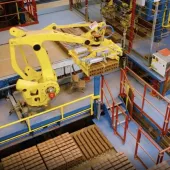Concrete solutions for student accommodation
Continuing growth in university accommodation offers opportunities for concrete construction
WITH student accommodation continuing to be a rare growth sector for the UK’s beleaguered construction industry, the concrete industry says it has developed a number of cost-effective solutions that are particularly well suited to this area of construction.
According to estate agents Knight Frank, student accommodation performed ‘exceptionally well’ during 2012, outperforming every other commercial property class and delivering consistent returns.
Construction of new accommodation has been underpinned by universities’ wish to attract first-year and overseas students, but Knight Frank believe that there is still an acute undersupply of quality student accommodation.
This is echoed by a recent report by CBRE, the property services group, that found that the amount of student accommodation under construction is insufficient to meet predicted demand.
CBRE report that more than £800 million was invested in student accommodation during the first half of 2012 – more than double the £375 million that was invested in the first half of 2011.
The demand for quality student accommodation that can be constructed quickly and cost-effectively has been noted by the UK concrete industry, which has developed a number of solutions that are particularly well suited for the construction of this building type.
‘Student accommodation is basically a cellular repetitive structure that is structurally simple and requires ease and economy of construction,’ explained Andrew Minson, executive director of MPA The Concrete Centre.
‘There are a number of concrete cellular solutions that offer both speed of construction and quality of build. All offer built-in, free-of-charge benefits that are particularly suitable for student accommodation, such as robustness, fire resistance, sound insulation, finished walls and thermal mass which can be used as part of a passive sustainability strategy.’
Various concrete cellular construction techniques are available, including Crosswall, which uses factory-made precast components custom designed and manufactured for each specific project, and Twinwall, which uses a combination of both precast and in-situ concrete.
A further solution, currently being used for new student accommodation for the University of Essex by contractors Bouygues, is construction of the in-situ walls and slabs on a 24h cycle.
‘All of these concrete solutions offer fast, cost-effective construction with a range of performance benefits that live up to the quality accommodation expectations of today’s students and provide financial returns for universities and investors,’ said Mr Minson.







